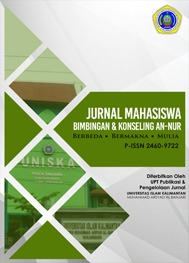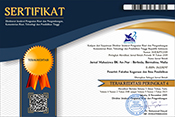TINGKAT EFIKASI DIRI MAHASISWA PROGRAM STUDI BIMBINGAN DAN KONSELING
(1) Universitas PGRI Adi Buana Surabaya
(2) Universitas PGRI Adi Buana Surabaya
(3) Universitas PGRI Adi Buana Surabaya
(*) Corresponding Author
Sari
This study aims to describe the level of academic self-efficacy of students of the Guidance and Counseling Study Program at PGRI Adi Buana University, Surabaya. The research samples were taken randomly in the 2020, 2021 and 2019 batches. This study used a descriptive quantitative approach using a self-efficacy scale. Data analysis used descriptive analysis with the help of SPSS. The results of the analysis show that the self-efficacy level of students in class 2019 is 93.37, class 2020 is 93.81 and class 2021 is 94.19. Individuals who have high self-efficacy are expected to perform better than individuals who are low, but in some conditions high self-efficacy can reduce effort on a task due to overconfidence, and thus lead to lower performance.
Kata Kunci
Teks Lengkap:
PDFReferensi
Bandura, A. (1986). The explanatory and predictive scope of self-efficacy theory. Journal of Clinical and Social Psychology, 4(3), 359-373. https://doi.org/https://doi.org/10.1521/jscp.1986.4.3.359
Baron, R. S., & Byrne. (2004). Social Psychology. Erlangga.
Bouffard-Bouchard, T., Parent, S., & Larivée, S. (1991). Influence of self-efficacy on self-regulation and performance among junior and senior high-school age students. Instructional Journal of Behavioral Development,, 14, 153-164. https://doi.org/10.1177/016502549101400203
Datu, J. A. D., Yuen, M., & Chen, G. (2017). Grit and Determination: A Review of Literature With Implications for Theory and Research. Journal of Psychologists and Counsellors in Schools, 27(2), 168-176. https://doi.org/https://doi.org/10.1017/jgc.2016.2
Flammer, A. (2001). Self-Efficacy. In International Encyclopedia of the Social & Behavioral Sciences, April.
Gazica, M. W., & Spector, P. E. (2015). Self-Efficacy. In In Wiley Encyclopedia of Management (pp. 1–2). : John Wiley & Sons, Ltd. .
Holleb, A. J. (2016). Principal Self-Efficacy Beliefs: What Factors Matter? Dissertation submitted to the faculty of the Virginia Polytechnic Institute and State University.
Ifdil, Bariyyah, K., Dewi, A. K., & Rangka, I. B. (2019). The College Academic Self-Efficacy Scale (CASES); An Indonesian Validation to Measure the Self-Efficacy of Students. Jurnal Kajian Bimbingan dan Konseling, 4(4), 115-121.
Kiranida, O., Komalasari, G., & Herdi. (2022). Pengaruh Kecerdasan Emosional dan Gender sebagai Moderasi terhadap Efikasi Diri dalam Pengambilan Keputusan Karier di SMA Negeri. Jurnal Mahasiswa BK An-Nur : Berbeda, Bermakna, Mulia, 8(3), 96-104.
Lianto. (2019). Self-Efficacy: A brief literature review. Jurnal Manajemen Motivasi, 15, 55-61.
Maddux, J. E. (2009). Self-Efficacy: The Power of Believing You Can. Oxford University Press.
Mufidah, E. F., Pravesti, C. A., & Farid, D. A. M. (2022). Urgensi Efikasi Diri: Tinjauan Teori Bandura. Prosiding Seminar & Lokakarya Nasional Bimbingan dan Konseling 2022, Universitas PGRI Adi Buana Surabaya.
Multon, K. D., Brown, S. D., & Lent, R. W. (1991). Relation of self- efficacy beliefs to academic outcomes: A meta-analytic investigation. 38(1). https://doi.org/https://doi.org/10.1037/0022-0167.38.1.30
Mustaqim. (2008). Psikologi Pendidikan. Pustaka Pelajar.
Owen, S. V., & Froman, R. D. (1988). Development of College Academic Self-Efficacy Scale Paper presented at the Annual Meeting of the National Council on Measurement in Education (New Orleans, LA, April 6-8,1988),
Pravesti, C. A., Mufidah, E. F., Farid, D. A. M., & Lathifah, M. (2022). Pentingnya Self-Regulated Learning pada Mahasiswa. Seminar Nasional Hasil Riset dan Pengabdian ke-4,
Putri, A. (2016). Pentingnya Kualitas Pribadi Konselor dalam Konseling untuk Membangun Hubungan Antar Konselor dan Konseli. Jurnal Bimbingan Konseling Indonesia, 1(1).
Ragil, E., Ariyanto, R. D., Ratnawati, V., Ningsih, R., & Valdino, D. R. (2019). Penerapan Teknik Modeling Berbasis Sinema Edukasi untuk Meningkatkan Efikasi Diri Akademik Siswa. Nusantara of Research : Jurnal Hasil-Hasil Penelitian Universitas Nusantara PGRI Kediri, 6(1), 50-59.
Sofianti, R. P., & Mufidah, E. F. (2021). Efektifitas Pendekatan Soluction-Focused Brief Therapy (SFBT) melalui Teknik Miracle Question dalam Konseling Individu untuk Meningkatkan Konsep Diri Remaja. Ristekdik (Jurnal Bimbingan dan Konseling), 6(1), 96-101.
Wulandari, D. P., & Pravesti, C. A. (2021). Pengembangan Permainan Ular Tangga Keyakinan dalam Peningkatan Efikasi Diri Siswa SMP. Counsellia: Jurnal Bimbingan dan Konseling, 11(1). https://doi.org/DOI: 10.25273/counsellia.v11i18882
Zimmerman, B. J., & Schunk, D. H. (1989). Self-Regulated Learning and Academic Achievement: Theory, Research, and Practice. Springer-Verlag.
DOI: http://dx.doi.org/10.31602/jmbkan.v9i1.9961
Refbacks
- Saat ini tidak ada refbacks.
Akun Akademik Anda Terhubung dengan :
Didedikasikan Untuk:
Jurnal Mahasiswa BK An-Nur : Berbeda, Bermakna, Mulia disseminated below Lisensi Creative Commons Atribusi 4.0 Internasional.
















